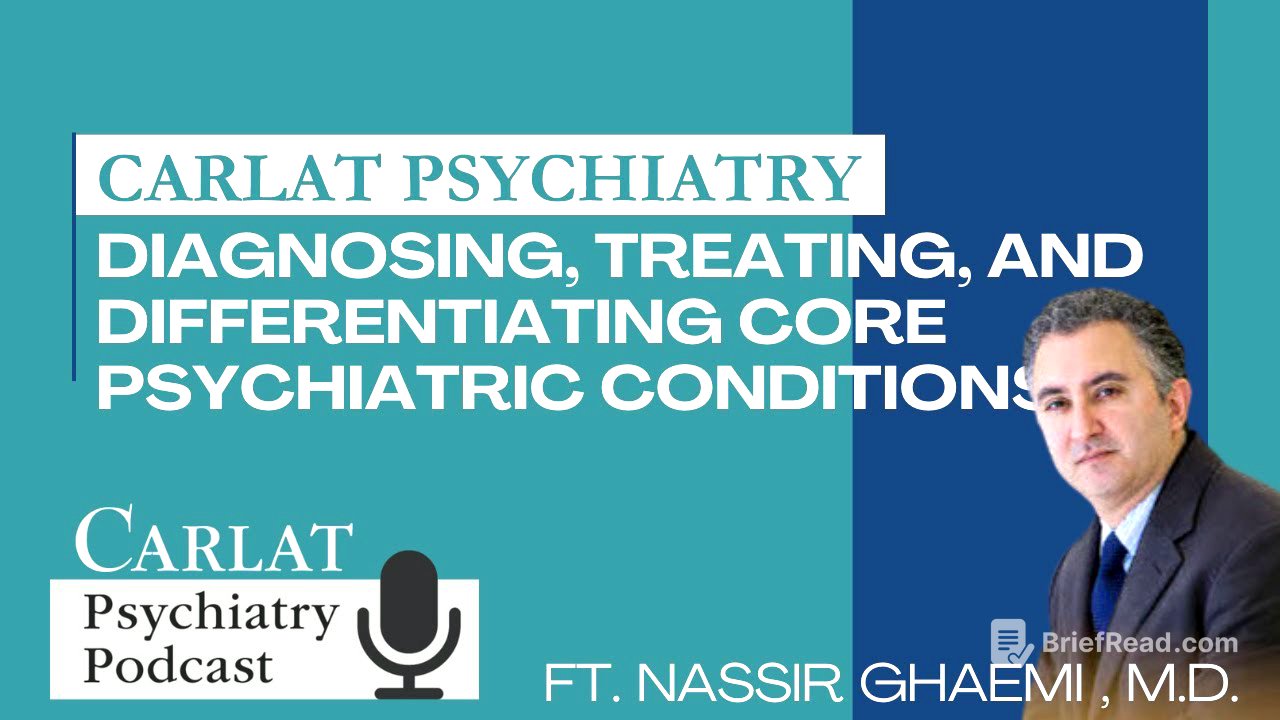TLDR;
This podcast features Dr. Nir Gami, an expert in bipolar illness and lithium therapy, discussing psychiatric diagnoses and their impact on treatment. He challenges the blanket statement that medication plus psychotherapy is always superior to either alone, advocating for evidence-based approaches specific to each condition. Dr. Gami critiques eclecticism in psychiatry, suggesting it leads to undisciplined practice, and emphasizes the importance of diagnostic hierarchies to avoid over-diagnosis and polypharmacy. He also touches on the validity of certain diagnoses like adult ADHD and personality disorders, advocating for a return to clinical research diagnostic criteria focused on validity.
- Medication plus psychotherapy is not always better than either alone; treatment should be evidence-based and condition-specific.
- Eclecticism in psychiatry can lead to undisciplined and unscientific practice.
- Diagnostic hierarchies are crucial to avoid over-diagnosis and polypharmacy.
- Adult ADHD and personality disorders have questionable validity as diagnostic concepts.
Intro [0:00]
The podcast episode introduces a discussion on psychiatric diagnosis and its impact on treatment. The host, Mark Ruffalo, welcomes Dr. Nir Gami, an expert in bipolar illness and lithium therapy from Tufts Medical Center and Harvard Medical School. Dr. Gami's expertise in psychopharmacology and the philosophy of psychiatry sets the stage for a conversation about psychotherapy, diagnostic hierarchies, and other relevant topics in the field.
Podcast [0:04]
Dr. Gami challenges the widely accepted notion that medication combined with psychotherapy is inherently superior to either treatment alone. He argues that this claim lacks sufficient evidence and may even be demonstrably false in certain cases. Using acute mania as an example, he points out the absence of research supporting the addition of psychotherapy to antipsychotics for effective treatment. He emphasizes that the effectiveness of combined treatments varies depending on the specific condition and severity, advocating for treatment decisions based on research and evidence rather than generalized beliefs.
Eclecticism in Psychiatry [4:25]
Dr. Gami critiques eclecticism in psychiatry, likening it to "anarchy" where the absence of guiding principles leads to inconsistent and potentially harmful patient care. He argues that this "anything goes" approach, rooted in postmodern relativism, lacks scientific support and undermines the credibility of psychotherapy. He points to a Gallup poll indicating low patient satisfaction with mental health clinicians, suggesting a disconnect between clinician practices and patient needs. Dr. Gami advocates for a more principled approach grounded in research and evidence-based treatments.
Psychotherapy in Bipolar Disease Management [7:49]
Dr. Gami discusses the role of psychotherapy in managing bipolar disorder, emphasizing that while the condition is primarily genetic and biological, psychological interventions can still play a supportive role. He notes that certain psychotherapies, such as Family-Focused Therapy and cognitive behavioral therapy, can help reduce life event stressors that trigger mood episodes. However, he clarifies that psychotherapy is not a treatment for the disease itself or an acute episode, but rather a means to reduce the likelihood or severity of episodes in relation to life events.
Psychiatric Disease vs. Clinical Picture [9:36]
Dr. Gami distinguishes between psychiatric diseases and clinical pictures, asserting that only a small subset of DSM diagnoses truly represent biological diseases. He identifies schizophrenia and manic-depressive illness as core disease entities, while suggesting that many other diagnoses are more akin to clinical pictures with psychosocial etiologies. He criticizes the DSM for prioritizing reliability over validity, advocating for a return to clinical research diagnostic criteria that emphasize evidence-based validity.
Diagnostic Hierarchy in Psychiatry [16:17]
Dr. Gami stresses the importance of a diagnostic hierarchy in psychiatry, advocating for a differential diagnosis approach similar to other medical fields. He criticizes the DSM's encouragement of multiple diagnoses based on overlapping symptoms, leading to poly-diagnosis and polypharmacy. He uses the example of diagnosing fever, chills, and night sweats as separate disorders instead of identifying the underlying cause, such as pneumonia. Dr. Gami attributes this issue to the eclectic and relativistic approach of DSM leaders, who he says have abandoned the pursuit of underlying causes in favor of symptom-based labeling.
Cyclothymic Temperament vs. Borderline Personality [19:47]
Dr. Gami provides guidance on differentiating between cyclothymic temperament and borderline personality disorder, emphasizing the limitations of relying solely on symptoms due to their overlap. He advocates for considering genetics and course of illness as key validators. Cyclothymia is genetic and part of manic-depressive illness, while borderline personality is half genetic and half environmental. He also notes the higher prevalence of sexual trauma and self-cutting in borderline personality disorder compared to cyclothymia.
Adult ADHD [23:33]
Dr. Gami expresses skepticism about the validity of adult ADHD as a distinct diagnosis, arguing that it often overlaps with other conditions like mood disorders and anxiety. He criticizes the DSM-5 for expanding the definition of ADHD, leading to increased diagnoses without sufficient evidence. He also points out that amphetamines, commonly prescribed for ADHD, have potential neurotoxic effects. Dr. Gami advises psychotherapists to look for underlying mood disorders or anxiety states in patients presenting with symptoms of adult ADHD.
Personality Disorder in the Psychiatric Diagnostic Hierarchy [28:12]
Dr. Gami discusses the placement of personality disorders in the psychiatric diagnostic hierarchy, noting that while they may capture a wide range of symptoms, other conditions like manic-depressive illness should be ruled out first. He questions the validity of personality disorders as a diagnostic concept, highlighting their relatively recent invention and historical context. He also mentions that the DSM-5 task force considered removing personality disorders due to a lack of scientific support, further undermining their validity.









